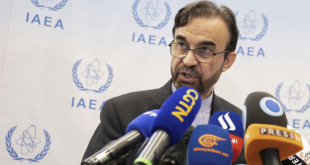Â
Iran will not retreat “one iota” from its nuclear program, Iranian President Mahmoud Ahmadinejad has said, as his new chief negotiator met Western diplomats for the first time.Â
Â
Analysts say the appointment of Saeed Jalili on Saturday might signal that Tehran is hardening its line on a program the West fears could be aimed at making nuclear bombs.Â
Â
Just before talks with EU foreign policy chief Javier Solana began in Rome at 1600 GMT (0200 AEST Wednesday), Iranian officials said policy was unchanged and Ahmadinejad rejected calls to suspend uranium enrichment – the key UN security council demand.Â
Â
“We are in favour of talks but we will not negotiate with anyone about our right to nuclear technology,” Ahmadinejad was quoted as saying by Iranian state television during a trip to Armenia.Â
Â
“Iran will not retreat one iota.”Â
Â
Jalili was joined by his predecessor as secretary of Iran’s Supreme National Security Council, Ali Larijani, who was quoted by Iranian media as saying nuclear policies “don’t change with a change in the secretary of the council or even presidents”.Â
Â
Jalili himself said that on the nuclear issue “there is a consensus in our country”.Â
Â
Iran’s refusal to halt work that can be used to make fuel for power plants or, if it wants, material for warheads, has prompted two sets of UN security council sanctions.Â
Â
British Prime Minister Gordon Brown told a news conference that Iran was in breach of the nuclear Non-Proliferation Treaty.Â
Â
“We take very seriously what Iran is proposing and we are prepared to use the methods that we have used and diplomatic sanctions to deal with this,” he said in London.Â
Â
“And I do not rule out anything.”Â
Â
Israeli premier Ehud Olmert, speaking alongside Brown, said economic measures were “not sufficient” and sanctions should be tightened “up to where Iran stops its nuclear program”.Â
Â
World powers have agreed to delay further penalties on Iran at least until November to see if Iran cooperates with UN International Atomic Energy Agency (IAEA) inspectors, and to await a report by Solana.Â
Â
Tehran insists its nuclear program is aimed at producing electricity so it can preserve more of its massive oil and gas reserves for export.Â
Â
Solana’s spokeswoman, Cristina Gallach, said his mandate remained unchanged – to explore the scope for entering formal negotiations with Iran on international requests that it halt sensitive nuclear activities.Â
Â
Solana had been in touch with US, Russian and Chinese officials in “intensive preparations” for the talks, she said.Â
Â
A US official said Solana would make a “similar offer” to the proposal by Russia’s Vladimir Putin, whereby foreign powers build Iran a civil nuclear system for electricity but without access to “more sensitive” aspects of nuclear technology.Â
Â
“We’ve offered diplomacy, they keep rejecting diplomacy, so I really think the ball is in their court,” US Undersecretary of State for Political Affairs Nicholas Burns said in New York.Â
Â
US Assistant Secretary of State Daniel Fried said in Berlin that security council backing for a third sanctions resolution might meet Russian opposition.Â
Â
But British Foreign Secretary David Miliband said in Washington he was confident both Russia and China would support a third round of UN sanctions.Â
Â
Robin Pomeroy And Phil StewartÂ
Â
The Canberra TimesÂ
 Eurasia Press & News
Eurasia Press & News


